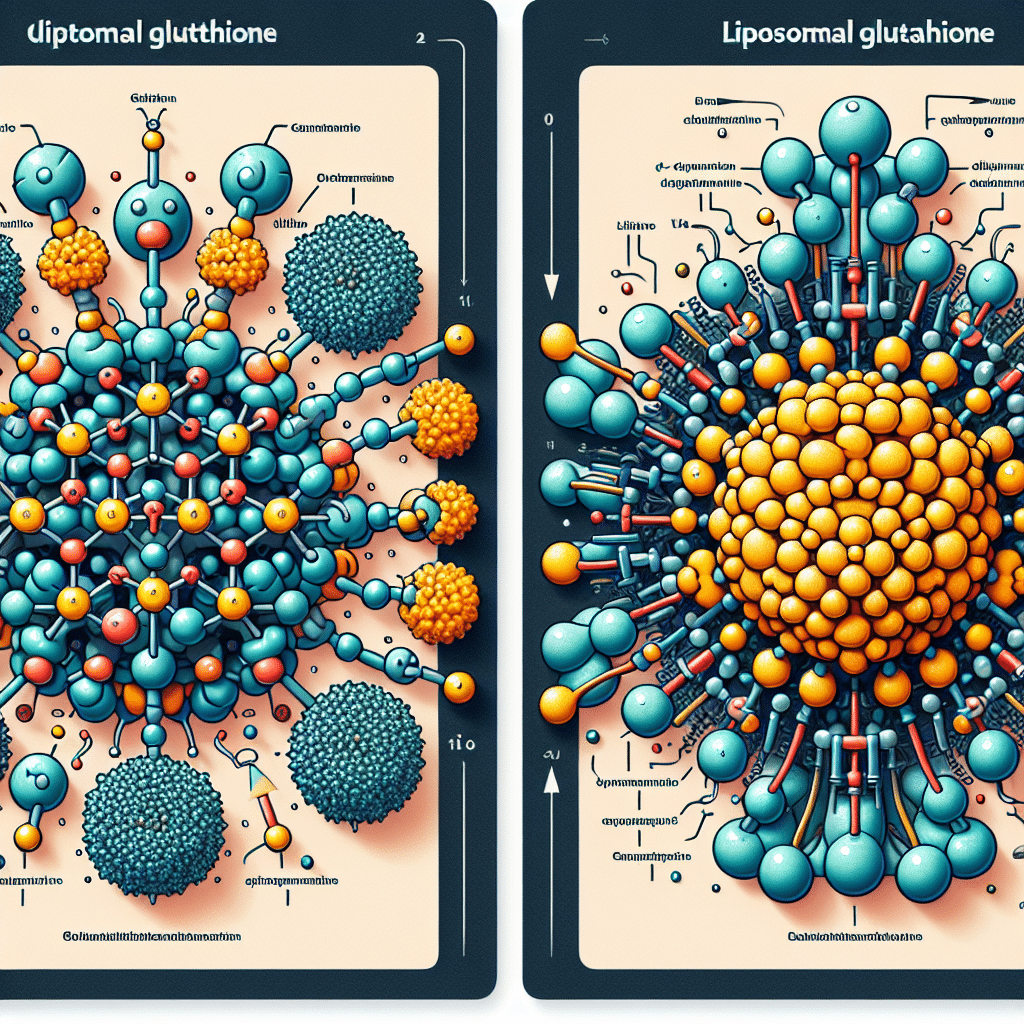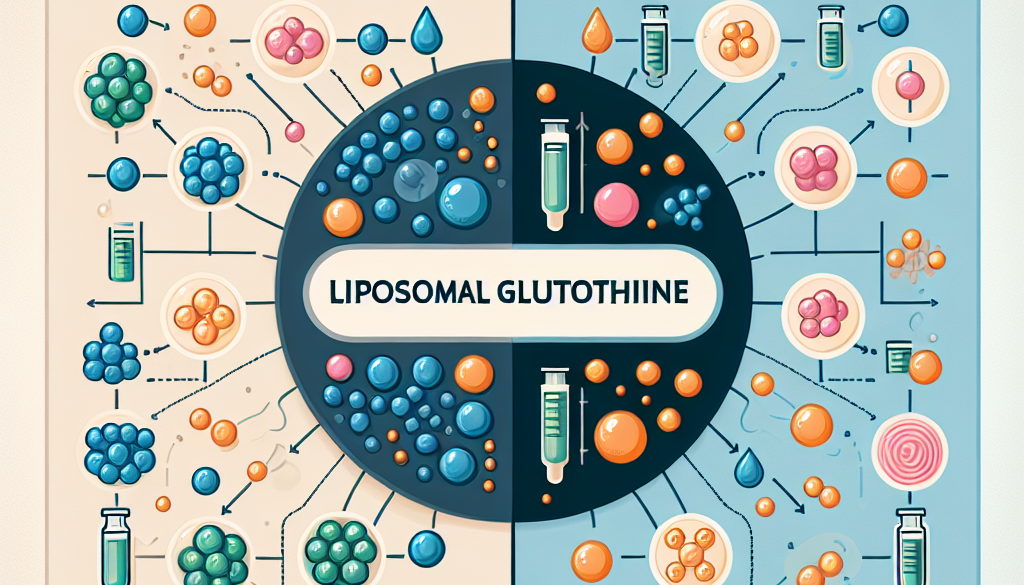Glutathione vs Liposomal Glutathione: Differences
-
Table of Contents
- Glutathione vs Liposomal Glutathione: Understanding the Differences
- What is Glutathione?
- Challenges with Traditional Glutathione Supplementation
- Introduction to Liposomal Glutathione
- Comparing Bioavailability: Glutathione vs Liposomal Glutathione
- Health Benefits and Uses
- Case Studies and Research
- Considerations for Supplementation
- Conclusion: Which Form of Glutathione is Right for You?
- Explore ETchem’s Protein Products
Glutathione vs Liposomal Glutathione: Understanding the Differences

Glutathione, often referred to as the “master antioxidant,” is a critical molecule in maintaining oxidative balance and overall health. However, its supplementation has faced challenges due to its poor bioavailability. This has led to the development of liposomal glutathione, a form designed to enhance absorption. In this article, we will delve into the differences between traditional glutathione and its liposomal counterpart, exploring the science behind each and their implications for health and wellness.
What is Glutathione?
Glutathione is a tripeptide composed of three amino acids: cysteine, glutamate, and glycine. It is naturally produced by the body and plays a pivotal role in protecting cells from oxidative stress, detoxifying harmful substances, and supporting the immune system. Despite its importance, certain factors such as aging, poor nutrition, and environmental toxins can deplete glutathione levels, leading to a need for supplementation.
Challenges with Traditional Glutathione Supplementation
Supplementing with traditional glutathione has its limitations. When taken orally, glutathione is broken down in the digestive tract before it can be effectively absorbed into the bloodstream. This results in a significant reduction in its bioavailability, which limits its potential benefits. Additionally, factors such as stomach acid and enzyme activity can further degrade glutathione, making it difficult for the body to utilize.
Introduction to Liposomal Glutathione
Liposomal glutathione is a form of glutathione that is encapsulated within liposomes—tiny, spherical vesicles made from the same material as cell membranes (phospholipids). This innovative delivery system is designed to protect glutathione from degradation in the digestive tract and facilitate its absorption into the bloodstream.
Comparing Bioavailability: Glutathione vs Liposomal Glutathione
The primary difference between traditional glutathione and liposomal glutathione lies in their bioavailability. Studies have shown that liposomal glutathione is more effectively absorbed by the body compared to non-liposomal forms. The liposomal encapsulation shields glutathione from harsh digestive enzymes, allowing it to reach the cells intact.
- Liposomal glutathione has been shown to raise blood glutathione levels more effectively than non-liposomal forms.
- The liposomal form may also have a longer-lasting impact on maintaining elevated glutathione levels in the body.
Health Benefits and Uses
Both forms of glutathione offer a range of health benefits due to their antioxidant properties. They can help combat oxidative stress, support detoxification, and improve immune function. However, due to its enhanced bioavailability, liposomal glutathione may offer more pronounced benefits in certain areas:
- Antioxidant Support: By effectively increasing glutathione levels in the body, liposomal glutathione can provide superior antioxidant protection against free radicals.
- Detoxification: Glutathione is crucial for detoxifying harmful substances. Liposomal glutathione may improve the body’s ability to eliminate toxins.
- Immune Health: Adequate glutathione levels are essential for immune function. Liposomal glutathione may better support the immune system due to its higher absorption.
Case Studies and Research
Several studies have highlighted the effectiveness of liposomal glutathione over its non-liposomal counterpart. For instance, a clinical trial demonstrated that individuals taking liposomal glutathione experienced significant increases in blood glutathione levels compared to those taking non-encapsulated glutathione. Moreover, research suggests that liposomal glutathione may be beneficial in managing conditions associated with oxidative stress and glutathione deficiency, such as chronic fatigue syndrome and liver disease.
Considerations for Supplementation
When choosing between traditional and liposomal glutathione, several factors should be considered:
- Quality: High-quality liposomal glutathione should have well-defined liposomes and contain pure glutathione.
- Dosage: The effective dosage may vary between individuals, and it’s essential to follow the recommendations of a healthcare provider.
- Cost: Liposomal glutathione is often more expensive than non-liposomal forms due to the complex manufacturing process.
Conclusion: Which Form of Glutathione is Right for You?
In conclusion, while both traditional and liposomal glutathione can offer health benefits, liposomal glutathione stands out due to its superior bioavailability and potential for greater efficacy. It is particularly beneficial for individuals looking to maximize the antioxidant and detoxification benefits of glutathione. However, the choice between the two forms should be based on individual health goals, budget, and guidance from a healthcare professional.
Explore ETchem’s Protein Products
If you’re interested in enhancing your health regimen with high-quality protein supplements, consider exploring ETchem’s range of protein products. ETchem is a reputable manufacturer and supplier known for their premium collagens and protein supplements that cater to various industries and health needs.
About ETChem:
ETChem, a reputable Chinese Collagen factory manufacturer and supplier, is renowned for producing, stocking, exporting, and delivering the highest quality collagens. They include marine collagen, fish collagen, bovine collagen, chicken collagen, type I collagen, type II collagen and type III collagen etc. Their offerings, characterized by a neutral taste, instant solubility attributes, cater to a diverse range of industries. They serve nutraceutical, pharmaceutical, cosmeceutical, veterinary, as well as food and beverage finished product distributors, traders, and manufacturers across Europe, USA, Canada, Australia, Thailand, Japan, Korea, Brazil, and Chile, among others.
ETChem specialization includes exporting and delivering tailor-made collagen powder and finished collagen nutritional supplements. Their extensive product range covers sectors like Food and Beverage, Sports Nutrition, Weight Management, Dietary Supplements, Health and Wellness Products, ensuring comprehensive solutions to meet all your protein needs.
As a trusted company by leading global food and beverage brands and Fortune 500 companies, ETChem reinforces China’s reputation in the global arena. For more information or to sample their products, please contact them and email karen(at)et-chem.com today.




